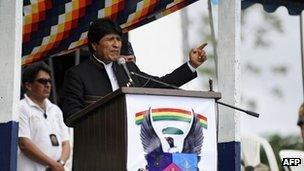Bolivia achieves coca-chewing victory at United Nations
- Published

Bolivian President Evo Morales has campaigned vigorously for the legalisation of coca
Bolivia has achieved a victory in its campaign to decriminalise the chewing of coca leaves.
It has been re-admitted to the UN Convention on Narcotic Drugs with a special dispensation recognising the practice as legal in Bolivia.
Bolivia withdrew from the convention last year in protest at its classification of the coca leaf as an illegal drug.
The chewing of coca leaves is a centuries-old tradition in Bolivia.
Coca, the raw ingredient for cocaine, has been used in the Andes for thousands of years as a mild stimulant and sacred herbal medicine.
'Great achievement'
Fifteen countries objected to Bolivia's special dispensation, far short of the 62 it would have taken to block the country from re-joining.
UN spokeswoman Arancha Hinojal said objections had been received from the United States, Mexico, Japan, Russia, Canada, the UK, Germany, France, Italy, the Netherlands, Sweden, Finland, Portugal, Israel and Ireland.
A US official said the administration continued "to believe it [the legalisation of coca leaves] will lead to a greater supply of cocaine and increased cocaine trafficking and related crime".
Bolivian President Evo Morales, who is also the head of Bolivia's coca growing union, had campaigned hard to get the UN to reverse what he called a "historic wrong" and lift its longstanding ban on the chewing of coca leaves.
Last year, he flew to a UN anti-drugs meeting in Vienna to lobby for its legalisation, saying coca was part of his country's heritage.
Coca leaves were declared an illegal substance under the 1961 UN convention.
It stipulated that coca-chewing should be eliminated within 25 years of the convention coming into effect in 1964.
President Morales said a celebration would be held on Monday with coca farmers to mark what Bolivian coca growers called "a great achievement".
- Published17 September 2012
- Published9 July 2012
- Published21 January 2011